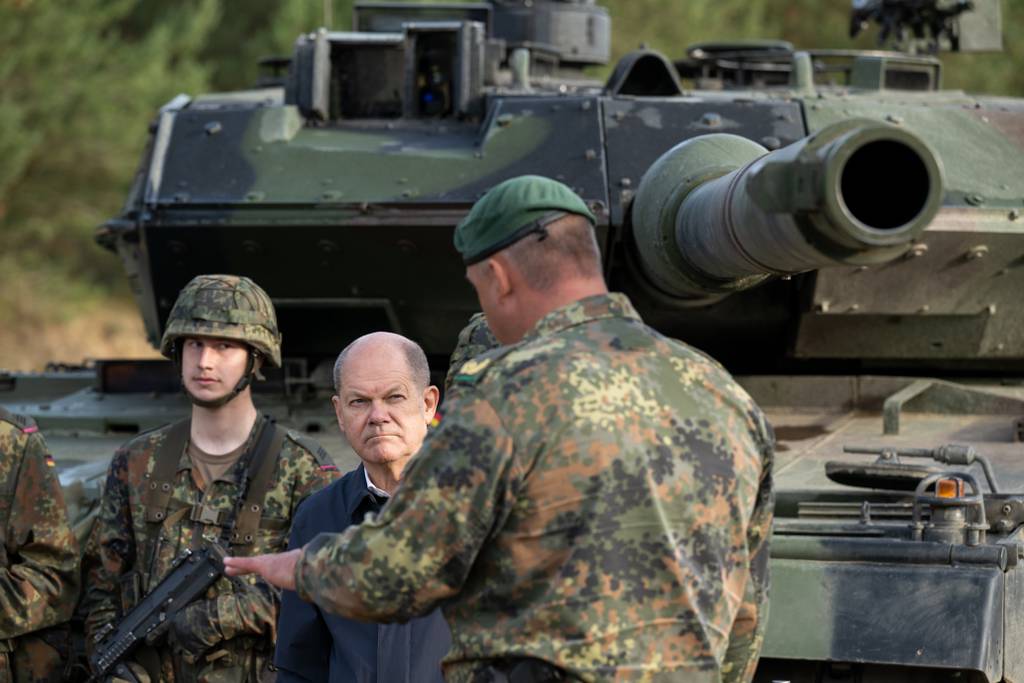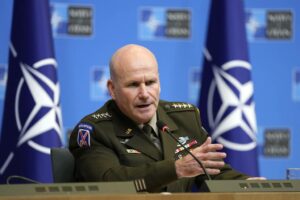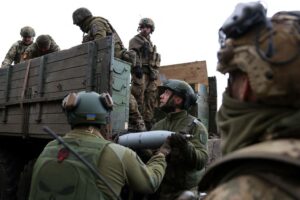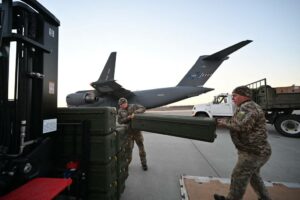
Three days after Russia invaded Ukraine, German Chancellor Olaf Scholz delivered a rousing speech to the Bundestag. He had a clear message: Russian President Vladimir Putin’s aggression has ushered in a new era of war in Europe, and wealthy countries like Germany, having pared down their defense spending for decades, needed to rearm. A year after German lawmakers applauded Scholz’s call to action, and as Scholz visits the White House on March 3, 2023, one must ask what has become of Germany’s much-heralded Zeitenwende, or “turning point.”
The results are mixed. On energy diversification, Germany demonstrated commendable initiative, with the International Energy Agency expecting an approximate 57% decline in the European Union’s imports of natural gas from Russia from 2021 to 2022. In 2021, the EU sourced nearly 25% of its petroleum oil from Russia in 2021; today, EU imports of seaborne Russian oil is prohibited.
The German rearmament plan, by contrast, has yet to begin, despite the fact that Scholz committed Germany to finally meeting NATO’s guideline of spending 2% of gross domestic product on defense, and established a special €100 billion (U.S. $106 billion) fund to beef up the Bundeswehr. Berlin has since announced that it won’t hit the 2% mark until 2025. As for the special fund, not a single penny has been spent so far.
Germany’s bureaucratized weapons procurement process, fraught coalition politics, and the testy relationship between the government in Berlin and defense industries have prevented the German government from turning words into concrete action.
Boris Pistorius, the new German defense minister, is now tasked with delivering on Scholz’s commitments so that the long-degraded Bundeswehr becomes a serious military force. He has a tough road ahead given Germans’ long-standing aversion to boosting defense spending.
At first blush, Germany’s lack of urgency on the defense front following Russia’s attack on Ukraine seems puzzling. Europe, after all, is experiencing its deadliest war in nearly 80 years. The Bundeswehr, with aircraft that can’t fly due to insufficient spare parts and tanks that break down during training, has long been a joke among defense experts on both sides of the Atlantic. German soldiers serving on NATO’s eastern front are often short of basic equipment like armored vests or winter jackets, to say nothing of the armaments needed to fight a powerful adversary.
Eva Högl, the Bundestag’s parliamentary commissioner for the armed forces, has been scathing in her criticism. “Reports by servicewomen and men of materiel deficits … left me shocked and dismayed,” Högl wrote in her most recent annual assessment. “Not a single field visit or conversation with servicewomen and men goes by without shortages or deficiencies being reported to me.”
Germany’s $4.3 trillion economy is the fourth largest worldwide; so whatever the explanation for the sorry state of its armed forces, lack of means can’t be possibly be one of them.
It would be easy to lay all of the blame for this sorry state of affairs at Germany’s feet. But it would also be wrong. Berlin’s lackadaisical approach to defense persists in part because of the long-standing American policy of treating it, and indeed other European allies, like children incapable of taking responsibility for their own defense. Washington complains about inequitable burden sharing even as it enables it.
To begin with, the U.S. in early 2022 had 38,500 troops stationed on German soil — almost 40% of the total number it deploys in all of Europe. Germany, like other NATO members, is protected by the U.S. nuclear umbrella. Every U.S. administration since the fall of the Berlin Wall has restated that guarantee.
Germany, therefore, runs little risk by maintaining a military that’s ill-equipped to fight. And this is precisely what successive German governments have done for the last three decades. The Bundeswehr’s active duty end strength has declined by 60% since 1990, the number of fighter aircraft is down by 47% and its stock of main battle tanks has diminished by a whopping 93%.
Furthermore, the U.S. continues to insist that Germany, and the rest of Europe, follow Washington’s lead on European security issues. Washington is quick to blame the Europeans for penny pinching on their defense budgets but has never favored anything approaching European self-sufficiency, let alone autonomy, in defense. Washington has discouraged such efforts, whether they included the 1998 U.K.-French initiative to create a credible, rapidly deployable EU military intervention force, or a project 20 years later that sought to synchronize military research and development among EU member states.
Whatever it may say in public, it’s abundantly clear the U.S. foreign policy establishment wants a collection of supplicants in Europe who dutifully follow Washington’s orders. So far, Washington has gotten its wish — Europe that simply cannot imagine a life without a large, permanent U.S. posture on the continent.
Given this history, nobody should be surprised if Scholz’s Zeitenwende proves to be nothing more than a slogan. U.S. policy, as well as Germany’s favorable strategic environment, serves as a great disincentive to the well-stocked and supplied Bundeswehr that Washington and Berlin both claim to want.
Daniel DePetris is a fellow at Defense Priorities, where Rajan Menon directs the grand strategy program. Menon is also a senior research fellow at the Saltzman Institute of War and Peace Studies at Columbia University.
- SEO Powered Content & PR Distribution. Get Amplified Today.
- Platoblockchain. Web3 Metaverse Intelligence. Knowledge Amplified. Access Here.
- Source: https://www.defensenews.com/opinion/commentary/2023/03/03/germanys-military-zeitenwende-is-off-to-a-slow-start/
- 1998
- 2%
- 20 years
- 2021
- 2022
- 2023
- 70
- a
- About
- Action
- active
- administration
- After
- agency
- ahead
- aircraft
- All
- alone
- American
- among
- and
- annual
- approach
- approaching
- armed
- assessment
- attack
- aversion
- basic
- Battle
- because
- become
- becomes
- Beef
- being
- berlin
- between
- Billion
- boosting
- Both Sides
- Break
- Budgets
- burden
- call
- call to action
- cannot
- CD
- chancellor Olaf Scholz
- Children
- claim
- clear
- collection
- Columbia
- commendable
- commissioner
- continent
- continues
- contrast
- Conversation
- Core
- countries
- create
- credible
- criticism
- Days
- decades
- Decline
- Defense
- delivering
- demonstrated
- deploys
- Despite
- Development
- discouraged
- diversification
- Domestic
- down
- during
- Early
- eastern
- efforts
- enables
- energy
- Environment
- equipment
- Era
- establishment
- EU
- Europa
- Europe
- European
- Europeans
- Even
- Every
- experiencing
- experts
- explanation
- Fall
- Feet
- fellow
- field
- fight
- Finally
- First
- follow
- following
- Force
- Forces
- foreign
- foreign policy
- Fourth
- from
- from 2021
- front
- fund
- GAS
- GDP
- German
- German government
- Germany
- given
- Goes
- Government
- Governments
- great
- gross
- guarantee
- having
- history
- Hit
- House
- HTML
- HTTPS
- images
- imports
- in
- incapable
- included
- industries
- Initiative
- Institute
- International
- intervention
- issues
- IT
- Lack
- large
- largest
- Last
- lawmakers
- lead
- Life
- little
- Long
- long-standing
- Main
- March
- mark
- means
- meeting
- member
- Members
- Men
- message
- Military
- mixed
- more
- most
- Natural
- Natural Gas
- nearly
- needed
- New
- nuclear
- number
- Oil
- ONE
- orders
- Other
- own
- Parliamentary
- part
- parts
- permanent
- persists
- Petroleum
- PHP
- plan
- plato
- Plato Data Intelligence
- PlatoData
- Point
- policy
- politics
- powerful
- precisely
- president
- process
- Product
- Program
- project
- protected
- proves
- public
- Quick
- rapidly
- recent
- relationship
- Reported
- research
- research and development
- responsibility
- REST
- Results
- Risk
- road
- Russia
- russian
- Russian oil
- Russian president
- security
- seems
- senior
- serious
- serves
- serving
- sharing
- shocked
- Short
- shortages
- should
- Sides
- simply
- since
- single
- slow
- So
- so Far
- special
- speech
- Spending
- spent
- start
- State
- States
- stock
- Strategic
- Strategy
- strength
- Stripes
- studies
- such
- supplied
- surprised
- taking
- Tanks
- The
- their
- therefore
- three
- to
- today
- Training
- treating
- Trillion
- Turning
- u.s.
- Ukraine
- umbrella
- university
- urgency
- Visits
- war
- washington
- Weapons
- What
- whether
- white
- White House
- WHO
- windows
- Winter
- without
- words
- worldwide
- would
- Wrong
- WSJ
- year
- years
- zephyrnet












